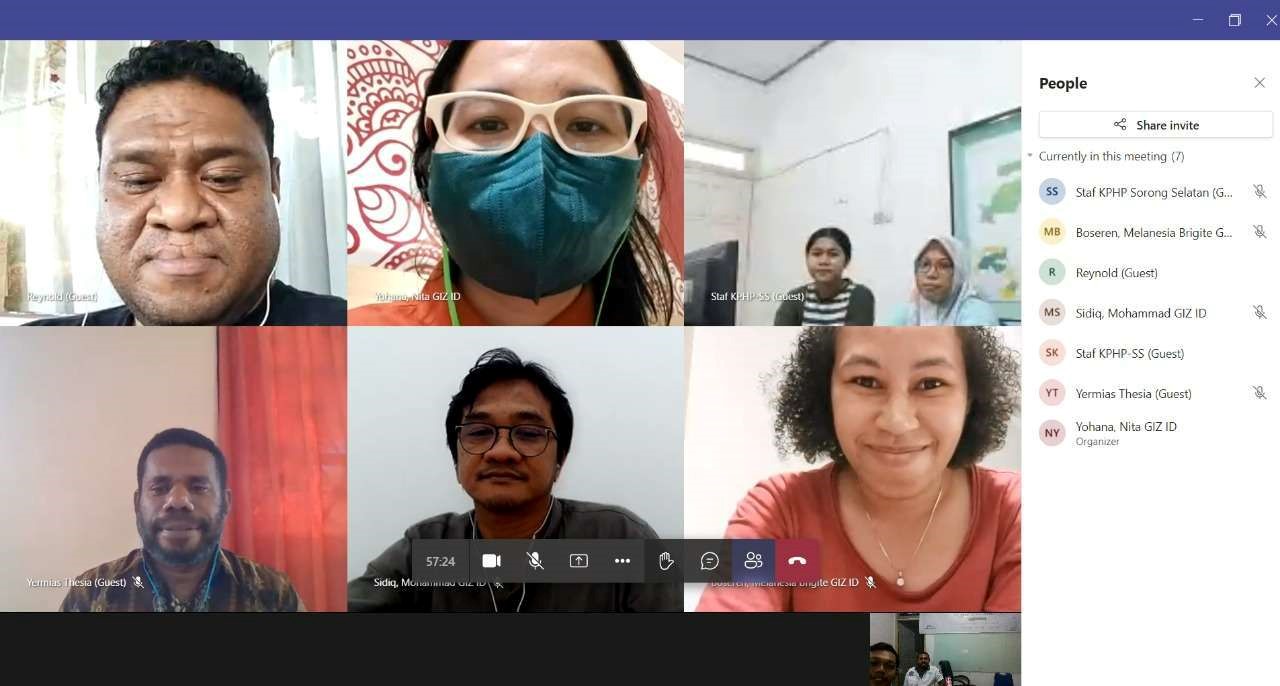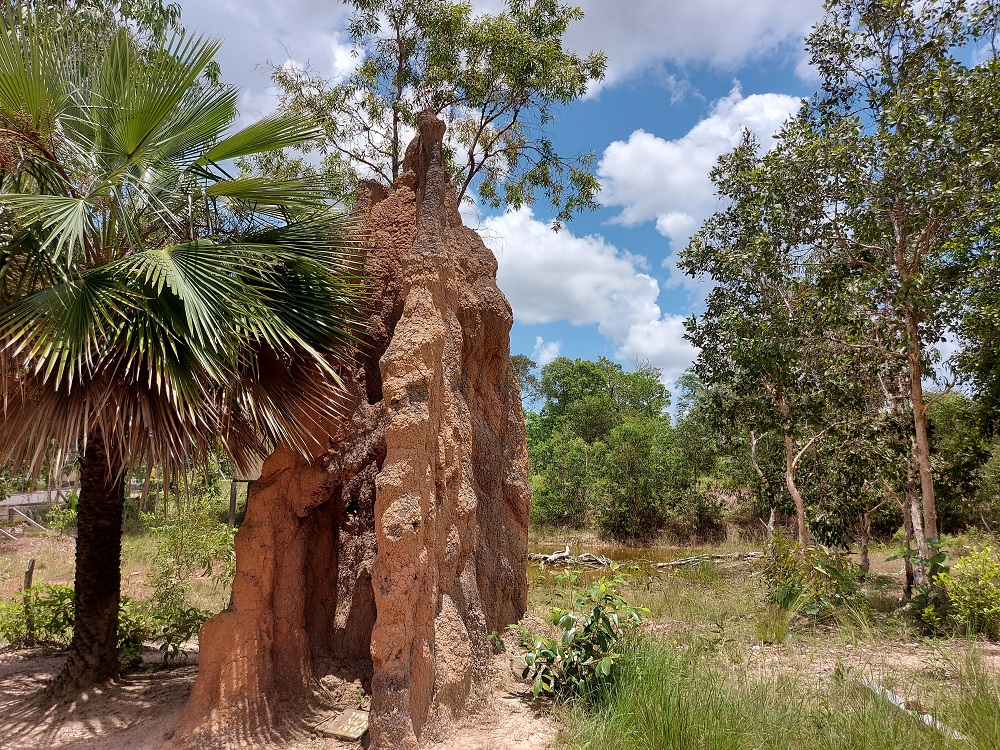FORCLIME
Forests and Climate Change ProgrammeTechnical Cooperation (TC Module)

Select your language

With the goal of preparing a Long-Term Forest Management Plan (RPHJP) document for the Production Forest Management Unit (KPHP) of Sorong Selatan, the West Papua Provincial Forestry Service held an online meeting on 4 November 2022 that was opened by the Head of KPHP Sorong Selatan, Reynold Kesaulija, S.Hut., M.Si., and attended by FORCLIME, as one of the development partners operating in West Papua Province.
During the meeting, the Head of KPHP Sorong Selatan asked for support for the implementation of forest use planning (tata hutan), which covers various activities, including the subdivision of the area into blocks and plots, the results of which will assist in the preparation of the RPHJP document. In terms of forest governance activities, FORCLIME has pledged its support for the consultation process (coaching clinic). However, this process will be implemented by the South Sorong KPHP in coordination with the Manokwari Forest Area Consolidation Center (BPKH).
In addition, a coaching clinic will be held in order to prepare an RPHJP for all KPHs operating in West Papua Province and is planned for the end of November or early December 2022. During this event, the bio-geophysical and sociocultural data of KPHP Sorong Selatan, which was collected in conjunction with FORCLIME, will be addressed during the discussions.
For more information, please contact:
Nita Yohana, Adviser for Sustainable Forest Management and Coordinator for West Papua Province
Mohammad Sidiq, Strategic Area Manager for Sustainable Forest Management and Coordinator for Papua and West Papua Provinces

Since 2013, FORCLIME has supported various partners in the promotion of sustainable forest management in collaboration with National Geographic Indonesia magazine. This year, 2022, this ongoing collaboration has been highlighting sustainable forest management and biodiversity conservation within the Wasur National Park in Merauke, South Papua. This activity, which is known as Pusparagam Wasur or Diversity of Wasur, has resulted in various products, including features and informative maps that have been published in National Geographic Indonesia (NGI) magazine, as well as short movies that have been uploaded to NGI's social media accounts.
This year's cooperation project differs slightly from those of previous years in that, in addition to the published materials outlined above, training sessions on the preparation and development of virtual tours have also been organized for Wasur National Park staff. As part of the promotional activities of national parks, virtual tours of national parks and ecotourism destinations are seen as the most effective media through which to promote ecotourism and a post-pandemic "new normal lifestyle". Through such activities, information about the Wasur National Park can be disseminated more widely.
In order to collect data and information, the NGI Team undertook an expedition to the Wasur National Park from 19 October to 1 November 2022. The first three days of Pusparagam Wasur's journey began with a training session in the preparation and development of a virtual tour of the Wasur National Park, which was attended by national park staff. The participants in the training session had the opportunity to improve their levels of expertise and skills as regards the making of short movies aimed at promoting the national park.
The expedition got underway at Kampung Rawa Biru, one of the national park-supported villages. This place became the starting point for the NGI Team in terms of the taking of pictures and the conducting of interviews with several community leaders. Among the locations visited were Youram Savana, Dolgamit Swamp and Tomer Beach, which are famed for their panoramic photo opportunities, wildlife viewing, wetland landscapes and migratory bird watching. In addition, the expedition also visited FORCLIME-assisted villages in the Wasur National Park, namely the villages of Yanggandur and Wasur. In Yanggandur, the team covered women's group activities that involved the production of non-timber forest products, including trigona honey (honey from stingless bee cultivation), ants’ nest tea (a herbal drink made from epiphytic plants of the genus myrmecodia) and eucalyptus oil. Meanwhile, in Wasur, the team covered the Sasi tradition (which comprises a set of customary rules that regulate a prohibition on the taking of natural resources from certain locations or hamlets during certain periods). Sasi is closely related to respect for relatives who have previously passed away. The ceremony that was performed during the visit revoked the most recent Sasi, which was instantiated a year after the death of a relative. The Sasi custom manages the area in an indirect way, allowing time for natural resources to grow back and restore their populations.
The results of the Pusparagam Wasur expedition will be published in the January 2023 edition of National Geographic Indonesia magazine and the hope is that information about the Wasur National Park will be widely disseminated among the magazine’s readership and reach a significant national audience. In addition, the short movies that have resulted from this collaboration will be uploaded to NGI's social media pages in the hope of reaching a younger generation.
For more information, please contact:
Mohammad Sidiq, Strategic Area Manager for Sustainable Forest Management and Coordinator for Papua and West Papua Provinces
Ratu Wina Widyawati, Programme Officer for Knowledge Management
The Irian porcupine or echidna (Zaglossus bruijnii) is a wild animal that is endemic to Papua and that has been categorized as a vulnerable species by the IUCN (International Union for the Conservation of Nature and Natural Resources), an international organization working in the field of nature conservation and the sustainable use of natural resources. The echidna is a monotreme or egg-laying mammal. However, during its various monitoring activities, the West Papua Natural Resources Conservation Agency (BBKSDA) has never managed to locate this animal, so its whereabouts cannot be ascertained with any certainty. Moreover, this rare species is believed to be in decline and is thus a vital subject for research.
In this regard, West Papua BBKSDA, supported by FORCLIME, conducted an Echidna survey in the BBKSDA working area of the Beriat Natural Tourism Park (TWA) from 17 October to 1 November 2022. The survey locations focused on three villages around the Beriat TWA area, namely Srer, Aibobor and Wehali, while the survey itself involved both interviews and direct observations.
Prior to conducting the survey, the personnel involved in the Echidna survey activities were first given rele-vant training. The training aimed to increase knowledge and skills as regards the inventorying of the Irian porcupine through direct observations and social surveys. Training for the Echidna identification survey was held from 14 to 16 October 2022 and involved the following participants:
- Six West Papua BBKSDA staff members.
- Four FORCLIME interns.
- One FORCLIME staff member.
- 10 participants from three survey location villages.
- Two participants from the University of Papua (Faculty of Teaching and Education and Diploma 3 Conservation at the Faculty of Forestry)
During the training, participants were presented with guidelines that addressed the search for the animals that were being surveyed, as well as further guidelines that addressed the conducting of field surveys or social observations and surveys. The observations were carried out through direct observation and trace identification techniques. Meanwhile, the social survey used the direct interview method, particularly with key informants from the relevant villages, for example, village heads, traditional leaders, religious leaders and hedgehog hunters. In addition, to these theoretical inputs, the training participants also engaged in practice sessions out in the field in Kampung Srer and TWA Beriat.
This activity was followed up with an analysis of the generated survey data, which has now been incorporated into a report. The results of the echidna survey will ultimately be used as a reference, not only by researchers but also by other stakeholders.
For more information, please contact:
Nita Yohana, Adviser for Sustainable Forest Management and Coordinator for West Papua Province
Mohammad Sidiq, Strategic Area Manager for Sustainable Forest Management and Coordinator for Papua and West Papua Provinces
 |
Supported By: |
  |